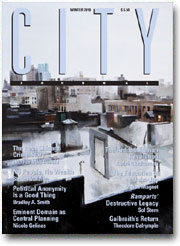Strike the Set
by James Panero
A militant union smothers New York theater.
You’ve got to hand it to New York’s stagehands’ union. Local One of the International Alliance of Theatrical Stage Employees (IATSE) has been collective-bargaining the life out of New York theater for over a century. Just how much does this union of carpenters, electricians, and prop masters bleed from city arts organizations? Carnegie Hall’s tax returns for its 2007–08 season suggest an answer.
Dennis O’Connell, Carnegie’s properties manager, has pulled down headline-making salaries from the concert hall for years. Between 2001 and 2003, for instance, his annual salary ranged between $309,000 and $344,000. But for the fiscal year ending in June 2008, O’Connell’s earnings topped $530,000, making him Carnegie’s highest-paid employee after its executive director, Clive Gillinson. Four other stagehands—carpenters James Csollany and Kenneth Beltrone and electricians John Goodson and John Cardinale—came in just behind, with salaries exceeding $400,000 apiece.
The Carnegie payouts received wide circulation in the New York media last fall after being reported in Bloomberg News. Yet the story only hints at a deeper truth well known in the New York arts community—one that affects Lincoln Center, all of Broadway, and numerous other venues. Because of the stranglehold of Local One–negotiated contracts, New York theater owners must all pay a sizable tribute each day just to keep the lights on. The pay rates that Local One secures for its stagehands far exceed the deals struck by other IATSE chapters nationwide, and many employees can pad their base pay with multiple surcharge triggers—overtime, missed meals, and tasks that mandate excessive staffing.
The money comes out of arts organizations’ bottom lines, driving up production costs and ticket prices and inhibiting the evolution of New York theater. “Any programming that does not resemble programming 30 years ago is prohibitive,” explains one theater manager. Pricey union contracts have “absolutely prohibited arts organizations from doing new things, particularly in difficult times.” The contracts also prevent organizations from expanding their reach through advances in technology like webcasting and simulcasts in movie theaters. The Metropolitan Opera had to spend years at the bargaining table to launch its Live in HD program.
The union has established a closed network of unchecked power. (To get a sense of its might, just try to speak to someone on the record.) When Local One workers talk about their “brotherhood,” some of them mean it literally: the chapter president, James J. Claffey, Jr., is the son of a Local One member and counts five brothers in the union. The leadership is predominantly Irish and male, and of the union’s 3,000 members, only about 130 are women. Thanks to a tiered salary structure and a union-controlled promotion system, not all of the members benefit from the big payouts. One anonymous blogger who identifies himself as a rank-and-file member rails against what he calls the union’s “Irish loop” system of preferment: “2500 victims plus the 350 to 500 plus relatives and loop boys (white, Irish, males).”
In better economic times, when theaters were flush, Local One’s impositions were bad enough. Now, as arts organizations are failing in the recession, the union’s compensation packages should receive the same scrutiny as the pay rates of top management. Keep in mind that the high salaries commanded by maestros and executive directors, which can exceed $1 million, were determined in an open marketplace. Could another prop master do O’Connell’s job just as well, and for less pay?
You can’t fault O’Connell: he performs a service and enjoys his legally agreed-upon compensation for doing so. The true blame rests with an arts leadership too weak-willed to fight union demands. The former general manager of the Metropolitan Opera, Joe Volpe, showed that such fecklessness wasn’t necessary. A former stagehand himself, with sons working as union extras, Volpe knew how to play tough against Local One. “At labor negotiations, for example, I can whoop and holler and scream and carry on like a wild man,” he once said. “I’ll shout that they can burn the place down but I’m never going to give in. And I’ll walk out. And their attorney will come over to me later and tell me it was great—that my act really helped him because until then the union was stuck in its position and he couldn’t get them to change.”
While Local One protects the lucky few at the top of the stagehand food chain, many more New Yorkers in the arts, unionized or not, are seeing their positions eliminated or their salaries cut during the current downturn because of unsustainable budgets. Arts leaders, who need to start controlling costs at all levels, also need the backbone to stare down the threat of a Local One strike. And if negotiations break down in the future, the arts community must overcome its unwillingness to cross picket lines for a justified cause that will help all workers. You don’t have to be antiunion to confront the inequity of Local One. You just have to be anti–Local One.
James Panero is the managing editor of The New Criterion.

